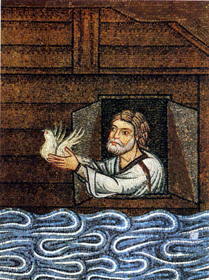For Sunday May 21, 2017
Lectionary Readings (Revised Common Lectionary, Year A)
Acts 17:22–31
Psalm 66:8–20
1 Peter 3:13–22
John 14:15–21
Exactly thirty years ago this week, I returned from teaching for three weeks at the Bangui Evangelical School of Theology in the Central African Republic. The seminary was founded in 1973 to train pastors from over twenty Francophone countries at a graduate level. Bangui was my first of what eventually became six trips to Africa.
Back in 2014, the seminary closed, a casualty of the chaos that had engulfed the country for about two years. Ban Ki-moon described the C.A.R. as in "free fall." France and the UN warned of genocide. Leaders of the African Union worried that the country could slip “into the abyss." One quarter of the population had been displaced.
But in the midst of all the chaos and violence, the seminary campus became a shelter for 1500 refugees (including Muslim families).
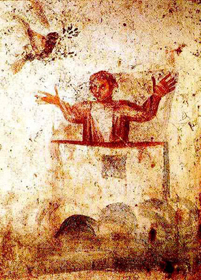 |
|
Noah and the Dove, Roman Catacomb, 2–4th century.
|
My friend Jack Robinson explained: "Because the school is just across the street from the telecommunications center for the country that is heavily guarded by French troops, it did not represent an attractive target for rebel soldiers. The campus was still secure, but all the campus buildings and classrooms were full of families grateful for some kind of shelter and security in the midst of the violence in the city."
When I mentioned this story to my friend Art, he had the perfect response: "That's what our churches should be — places of refuge."
The reading from 1 Peter 3 this week is one of the most complicated texts in the New Testament. In his commentary on 1 Peter, Martin Luther threw up his hands: “A wonderful text is this, and a more obscure passage perhaps than any other in the New Testament, so that I do not know for a certainty just what Peter means.”
"For Christ also died for sins once for all, the just for the unjust, so that he might bring us to God, having been put to death in the flesh, but made alive in the spirit; in which also he went and made proclamation to the spirits now in prison, who once were disobedient, when the patience of God kept waiting in the days of Noah, during the construction of the ark, in which a few, that is, eight persons, were brought safely through the water. Corresponding to that, baptism now saves you — not the removal of dirt from the flesh, but an appeal to God for a good conscience — through the resurrection of Jesus Christ."
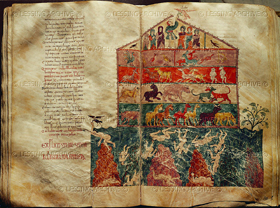 |
|
Spanish manuscript, c. 900-975.
|
Scholars debate everything about these verses — the punctuation, the pronouns, the verb tenses, the meaning of every word. The references to Noah, the flood, and his ark have provoked the best and worst from Christians.
You can visit full-size replicas of Noah's ark in Holland and Hong Kong. Bogus pseudo-science explains the flood. Since the third century, explorers have tried to find the archaeological remains of the ark. There's also the cruel theology of the church fathers that just as there was no salvation outside of Noah's ark, there's no salvation outside the Christian church.
But Noah's story has also inspired our better angels. Consider the artistic expressions like the five that I've included with this essay — catacomb frescoes, illuminated manuscripts, massive church doors, mosaics, tapestries, and more. Hugh of St. Victor (d. 1141) wrote three treatises based upon Noah's ark.
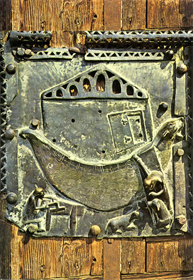 |
|
12th century bronze door, Italy.
|
Beyond all the complications and obfuscations, 1 Peter 3 makes a simple but profound point when it compares church baptism to Noah's ark — the church should be a place of refuge, safety, and salvation. It is a life boat. A shelter from the storm.
The seminary campus in Bangui thus brought to life a literary metaphor.
Traditional church architecture has expressed the story of Noah. The main part of the church where the congregation sits is called the nave. The word "nave" comes from the Latin word "navis," meaning ship (a collection of ships is a "navy"). The church nave symbolizes a ship with its vaulted ceiling looking like an inverted keel. And so the church is a safe place in a storm.
In his book Whistling in the Dark: A Doubter's Dictionary (1988), Fredrick Buechner comments on the church as Noah's ark:
In one as in the other, just about everything imaginable is aboard, the clean and the unclean both. They are all piled in together helter-skelter, the predators and the prey, the wild and the tame, the sleek and beautiful ones and the ones that are ugly as sin. There are sly young foxes and impossible old cows. There are the catty and the piggish and the peacock-proud. There are hawks and there are doves. Some are wise as owls, some silly as geese; some meek as lambs and others fire-breathing dragons. There are times when they all cackle and grunt and roar and sing together, and there are times when you could hear a pin drop. Most of them have no clear idea just where they’re supposed to be heading or how they’re supposed to get there or what they’ll find if and when they finally do, but they figure the people in charge must know and in the meanwhile sit back on their haunches and try to enjoy the ride.
It’s not all enjoyable. There’s backbiting just like everywhere else. There’s a pecking order. There’s jostling at the trough. There’s growling and grousing, bitching and whining. There are dogs in the manger and old goats and black widows. It’s a regular menagerie in there, and sometimes it smells to high Heaven like one.
But even at its worst, there’s at least one thing that makes it bearable within, and that is the storm without — the wild winds and terrible waves and in all the watery waste no help in sight.
And at its best there is, if never clear sailing, shelter from the blast, a sense of somehow heading in the right direction in spite of everything, a ship to keep afloat, and, like a beacon in the dark, the hope of finding safe harbor at last.
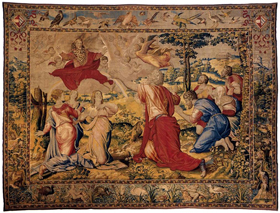 |
|
Wool and silk tapestry by Willem de Pannemaker, 1567, God's covenant with Noah.
|
Thus, Jesus the redeemer effected a great reversal. Whereas the waters of the Flood brought death and destruction, the waters of baptism bring new life, protection from danger, and a shelter in the storm.
For further reflection:
"The Church is like Noah’s ark that was full of both clean and unclean animals. It must have had an unholy smell, and yet it was carrying eight persons to salvation. The world today is tearing up the photographs of a good society, a good family, a happy, individual personal life. But the Church is keeping the negatives. And when the moment comes when the world wants a reprint, we will have them." ~ Archbishop Fulton Sheen
Image credits: (1) Wikipedia.org; (2) ShelleySDavies.com; (3) ShelleySDavies.com; (4) Wikipedia.org; (5) HealOurChurch.wordpress.com.

